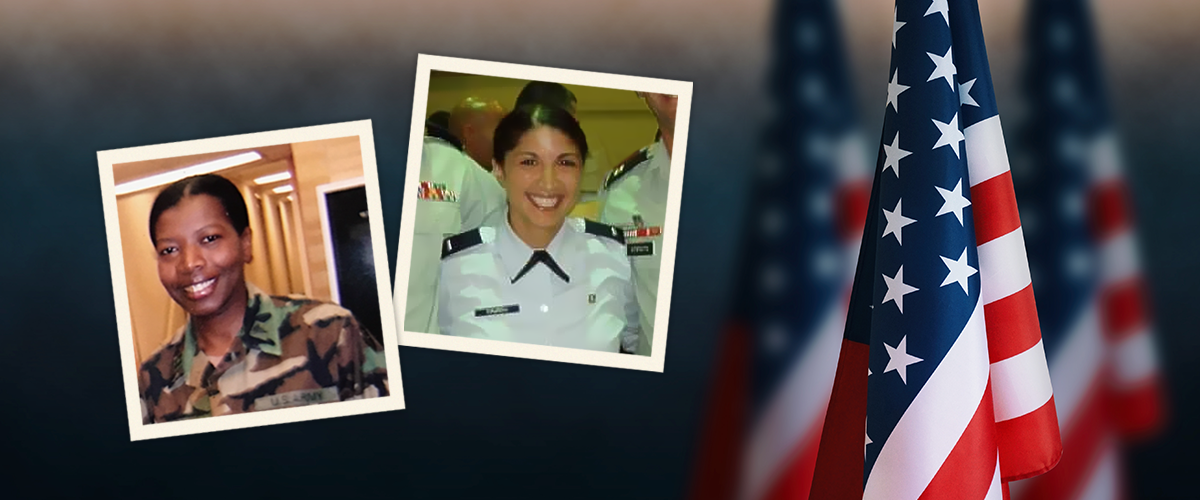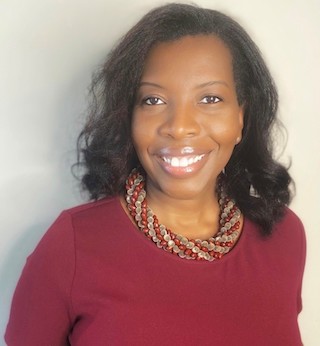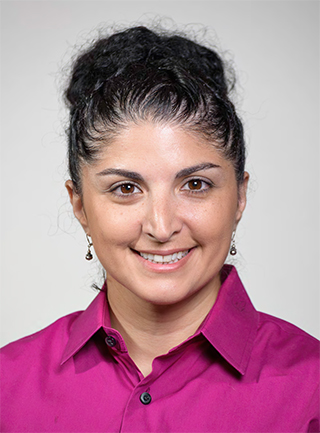Stories of Service: Two Physicians Reflect on Their Time in the Military
On Veterans Day, two NewYork-Presbyterian physicians share their experiences from serving the country and the lessons they carry with them.


In 2008, Dr. Meedlen Charles, now an obstetrician and gynecologist at NewYork-Presbyterian Hudson Valley Hospital, was a Brigade Surgeon in the U.S. Army, deployed in Afghanistan. “I was in charge of about 2,500 soldiers, the medics, and the physician assistants,” Dr. Charles recalls. “I would travel back and forth to the different outlying bases and deliver OB-GYN services to the other female soldiers. I remember one time we were going into one particular base on the helicopter. It was 11 p.m. and we had to wait, and I realized the base was being hit.”
The memory sparked something in Dr. Sarah Vossoughi, a transfusion medicine attending at NewYork-Presbyterian/Columbia University Irving Medical Center, who was listening to Dr. Charles tell her story. “Was it Bagram?” asks Dr. Vossoughi, who was a Captain in the U.S. Air Force. “I was flying into Bagram in 2008 when they were getting hit. We were in the air, and we had to circle for a while. It might’ve been the same attack, because it was a big one. I think we were probably within feet of each other on that deployment.”

Dr. Meedlen Charles
“I can’t believe we were so close,” Dr. Charles says.
Dr. Charles and Dr. Vossoughi had never met, but they soon learned they had much more in common beyond being at the same place on that intense night. The two women both chose to pursue medicine, navigated serving in combat as women, and to this day remain driven by a desire to help and serve others. Years after basic training, combat landings and new terrains, they are now both at NewYork-Presbyterian as physicians.
In honor of Veterans Day, Dr. Charles and Dr. Vossoughi share their stories of personal and professional growth through their military service.
On adjusting to military life
Dr. Charles: When I deployed to Afghanistan, we were about 8,000 feet above sea level in the mountains. As you’re taking a shower, the water is freezing under your feet. It’s those kinds of things that you have to get used to.
And that’s just the way of life. The body armor was very ill-fitting, but you had no choice. That’s what you had, and what you had to use.

Dr. Sarah Vossoughi
Dr. Vossoughi: I used to have to strap my chest down, because tactical teams didn’t have body armor for women. We had to fit into these flat, straight plates designed for a tall man’s back. It hurt when you had to carry all your equipment, and it was 70 pounds. I remember that being really uncomfortable.
We were in combat situations, but we didn’t necessarily receive the same combat pay. We received hardship pay and hazard pay, but the men received combat pay.
On being a woman in the military
Dr. Charles: I went to all-girls private Catholic schools all my life, except for when I went to medical school.
When I went to the Army, I had to make sure I was more comfortable around guys and that I was ready to speak whenever I needed to and stand my ground about things that I felt were important.
Dr. Vossoughi: It helped me learn that you can’t wait to be invited to the table.
Especially when you’re an officer in the military, if you’re a woman and you’re in command, when you walk into the room, you take your seat.
On the lessons they learned in service and how it informs their work today
Dr. Charles: I learned a lot about myself while in the Army. It not only made me stronger, but also instilled a belief in me that I can handle anything.
My time in the Army, on certain days, was really hard. It wasn’t easy putting on 80 pounds of gear and marching for five miles at night. You don’t realize the strength that you have until you have to face adversity.
Working in Hudson Valley, I have been able to take care of active duty patients here from West Point. As a veteran, I am able to understand their needs and the limitations they have compared with the rest of our patient population.
Dr. Vossoughi: For me, it was really a coming of age. I learned how to stand up for myself, how to hold my head high.
I learned how to lead a group of people, to get them to hear you, how to solve problems that you think are impossible.
In the military, we don’t wonder ‘if’ we can accomplish something — we ‘will’ and we ‘do’. Restructuring the way I saw the world, and more importantly, what I believed myself to be capable of, is the single most valuable thing I have learned in my life.
With those lessons, I am now able to stretch myself further in service of my patients and learn the latest technologies. I simply do what needs to be done because my mission now as a civilian is to take the best possible care of my patients. Nothing will stand between me and my mission.
On what they’d like people to know on Veterans Day
Dr. Charles: I want people to think about not only the veterans, but the families. When I was deployed, it wasn’t only me. It was my family. They were so worried and stressed.
Dr. Vossoughi: I’d like people to remember that there are so many people who have served, and everybody served in different ways: those who worked on the flight line and repaired the equipment we used, who drove the trucks through dangerous territory to get us the medical supplies that we needed.
Veterans are everywhere.
Meedlen Charles, M.D., is an obstetrician and gynecologist at NewYork-Presbyterian Hudson Valley Hospital and an assistant professor of obstetrics and gynecology at Columbia University Vagelos College of Physicians and Surgeons. She was a Brigade Surgeon in the U.S. Army and chief of OB-GYN at Irwin Army Community Hospital in Fort Riley, Kansas. She served from 2001 to 2013 and did her tour of duty in Afghanistan.
Sarah Vossoughi, M.D. R.N., is dual boarded in clinical pathology and transfusion medicine. She is the medical director of apheresis and associate director of transfusion medicine and cellular therapy at NewYork-Presbyterian/Columbia University Irving Medical Center. She is also an assistant professor of pathology and cell biology at Columbia University Vagelos College of Physicians and Surgeons. She was a Captain in the U.S. Air Force and a medical crew director for a Tactical Aeromedical Evacuation Team. She served from 2004 to 2012 and did her tours of duty in South Korea, Iraq, and Afghanistan.

